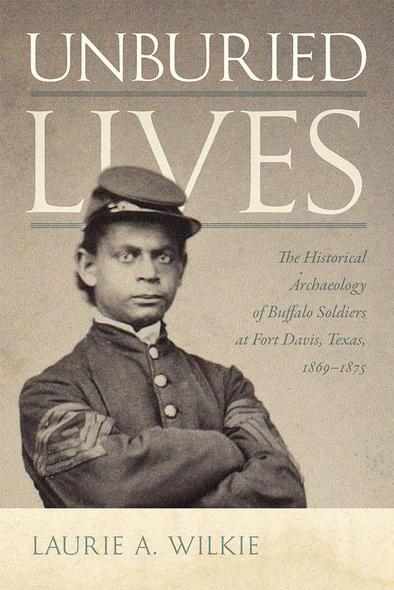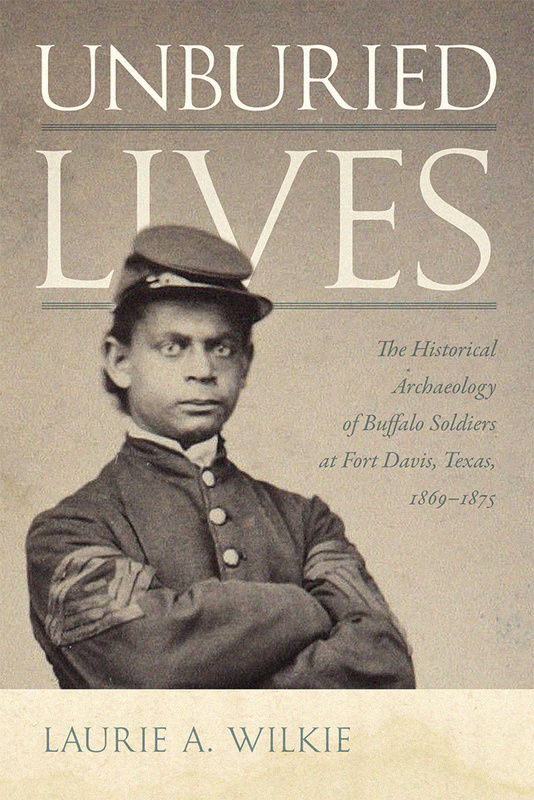
Unburied Lives
The Historical Archaeology of Buffalo Soldiers at Fort Davis, Texas, 1869–1875
According to the accounts of two white officers, on the evening of November 20, 1872, Corporal Daniel Talliafero, of the segregated Black 9th cavalry, was shot to death by an officer’s wife while attempting to break into her sleeping apartment at the military post of Fort Davis, Texas. Historians writing about Black soldiers serving in the West have long accepted the account without question, retelling the story of Daniel Talliafero, the thwarted "rapist."
In Unburied Lives Wilkie takes a different approach, demonstrating how we can "listen" to stories found in things neglected, ignored, or disparaged—documents not consulted, architecture not studied, material traces preserved in the dirt. With a focus on Fort Davis, Wilkie brings attention to the Black enlisted men and non-commissioned officers. In her archaeological accounting, Wilkie explores the complexities of post life, racialized relationships, Black masculinity, and citizenship while also exposing the structures and practices of military life that successfully obscured these men’s stories for so long.
Examining materials recovered from six archaeological locales as well as orphaned collections, Wilkie uses the science of archaeology to flesh out the documentary accounts of military life at a frontier outpost. She weaves these elements into engaging stories of some of the Buffalo soldiers. The result is a fetching and entertaining study of Western history that illuminates and reinterprets a story often distorted by Hollywood movies and dime novels.
Wilkie’s skillful use of the archaeological and documentary records provides much-needed nuance for understanding the lives of Buffalo soldiers. This book provides a much-needed corrective and complicates previously dichotomous thinking to more accurately represent the challenges and rewards of their military lives.
Wilkie’s study of the Buffalo soldiers and military life at Fort Davis is bold and innovative. She reveals a complex web of material and social entanglements that illustrate the military’s complicity in anti-black racism while highlighting the various ways that black men—as soldiers, husbands, friends, and fathers—navigated an especially difficult terrain to demonstrate their humanity and rights to citizenship.
Laurie A. Wilkie is the Richard and Rhoda Goldman Distinguished Professor of Social Sciences at the University of California, Berkeley. Her books include Strung Out on Archaeology: An Introduction to Archaeological Research, The Lost Boys of Zeta Psi: A Historical Archaeology of Masculinity at a University Fraternity, and The Archaeology of Mothering: An African-American Midwife’s Tale.
List of Illustrations
List of Tables
Acknowledgments
Important Persons in This Work
Prologue
Chapter One. Black Soldiering Matters at Fort Davis: Taking an Archaeological Approach to Frontier Life
Chapter Two. Corporal Williams’s Tent: Frontier Military Spaces
Chapter Three. Private Stevenson’s Pocketknife and Company K’s Tumbler
Chapter Four. Sergeant Hewey’s Stick
Chapter Five. Private Johnson’s Letters
Chapter Six. Sergeant Sample’s Eyesight
Chapter Seven. Daniel Tallifero’s Cap
Epilogue
Notes
Bibliography
Index




